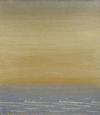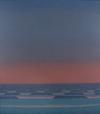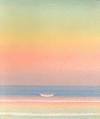
Learn foreign languages while watching your favorite YouTube videos!
The Language learning app is a handy set of tools that will help you improve your language skills by accessing subtitles, a built-in dictionary, and saving words and phrases you want to learn to revise.
Learning foreign languages will be an interesting and exciting experience for you!
I am not a realist. Nor am I
an impressionist, a pointillist,
a surrealist, a minimalist, or
an abstract expressionist.
Yet I assert that my work,
at its best, functions within
all of these disparate
categories.
These are not paintings of
objects. They are not
souvenirs of places, and
they do not tell stories.
They do present a
recognizible image, combined
with an illusion of great
depth. The image consists of
the sea and sky. This is not
the real, physical sea, but a
metaphor, and as such I
propose that it is the most
universal of all.
Biography: In the hour after the sun sets into the sea, nature's
palette defies description. The names of colors are simply
inadequate, so we resort to metaphor, describing the sky
as moody, the light as inspiring, the water as wary. The
artist Carson Collins believes this is why the emotional
truth of his twilight seascapes is more important than their
pictorial truth. Without realizing it, we enter the scenes of
his paintings ourselves, and suddenly the experience of
the moment is not his, but ours. "I'm not sending a
message," the artist says. "I'm offering an opportunity."
His paintings, which invariably show the ocean horizon in
early evening, framed by gentle foreground surf and
infinite sky, can be mesmerizing. Some collectors compare
them to Mandalas. Like those Buddhist works, which grow
more absorbing the longer you look, Collins' paintings draw
out reactions that begin subconsciously and then flower
into insight. "Everyone has been on an empty beach to
watch the sunset," he points out. "Some people turn their
backs after the sun goes down, because for them the
action's over. Some of us keep looking, because for us the
action's just beginning."
In fact, Collins spends hours each day studying the sea,
and has maintained this practice for years while living on
some of the world's choicest coastland: from the Bahamas
to the Baltic, from California to the Caribbean, from Maui
to Mauritius. "The sea is the oldest, best metaphor we
have for human experience," he says. "It's the cradle of
life, the mystery of death, the horizon we're always
traveling toward. The more experience we have of the
sea, the more experience we have of what it is to be
human." His paintings, which range in size from several
feet on a side to more than 60 square feet, are named for
particular moments in particular places. The point is not to
freeze a moment in time, but to open it up and find the
essential qualities that will keep it alive for others to
experience.
Collins works with acrylic paint on canvas, in part because
the fast-drying combination is well suited to seaside
climates but also because it forces him to prepare
thoroughly before working quickly to capture a subject
that is, by its nature, disappearing as he paints it. He has
exhibited in solo shows in such cultural centers as New
York, San Francisco, and Stockholm, as well as in more
exotic capitals such as San Jose, Costa Rica. His work has
been called minimalist, impressionist, even surrealist -
intriguing in a world that seems to love categorizing art as
much as looking at it. But Collins is not trying to fit into a
category or prove any theories. He's not even trying to
tell us a story. Instead he wants to draw us so completely
into nature's story that we tell it to ourselves. As his
colors, textures, and technique begin to work their magic,
we feel the loss of the sun slipping into the sea, the
closeness of the evening draw around us like a cloak, and
the tug of a memory so long forgotten, so deeply
welcomed.
Thom Elkjer 1999
Country: United States
E-mail: carson@theoceanseries.com
Site: http://www.theoceanseries.com




